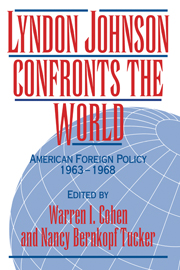Book contents
- Frontmatter
- Contents
- Dedication
- Acknowledgments
- List of Contributors
- Introduction
- 1 Lyndon B. Johnson: Change and Continuity
- 2 Johnson, Vietnam, and Tocqueville
- 3 “A Time in the Tide of Men's Affairs”: Lyndon Johnson and Vietnam
- 4 Threats, Opportunities, and Frustrations in East Asia
- 5 Toward Disillusionment and Disengagement in South Asia
- 6 Lyndon B. Johnson, Germany, and “the End of the Cold War”
- 7 The Promise of Progress: U.S. Relations with Latin America During the Administration of Lyndon B. Johnson
- 8 Keeping Africa off the Agenda
- 9 Balancing American Interests in the Middle East: Lyndon Baines Johnson vs. Gamal Abdul Nasser
- 10 Lyndon Johnson: A Final Reckoning
- Suggestions for Further Reading
- Index
9 - Balancing American Interests in the Middle East: Lyndon Baines Johnson vs. Gamal Abdul Nasser
Published online by Cambridge University Press: 05 June 2012
- Frontmatter
- Contents
- Dedication
- Acknowledgments
- List of Contributors
- Introduction
- 1 Lyndon B. Johnson: Change and Continuity
- 2 Johnson, Vietnam, and Tocqueville
- 3 “A Time in the Tide of Men's Affairs”: Lyndon Johnson and Vietnam
- 4 Threats, Opportunities, and Frustrations in East Asia
- 5 Toward Disillusionment and Disengagement in South Asia
- 6 Lyndon B. Johnson, Germany, and “the End of the Cold War”
- 7 The Promise of Progress: U.S. Relations with Latin America During the Administration of Lyndon B. Johnson
- 8 Keeping Africa off the Agenda
- 9 Balancing American Interests in the Middle East: Lyndon Baines Johnson vs. Gamal Abdul Nasser
- 10 Lyndon Johnson: A Final Reckoning
- Suggestions for Further Reading
- Index
Summary
The men who advised Lyndon Johnson on issues relating to the Middle East perceived three important American interests there. First, the influence of the Soviet Union had to be contained. Second, Israel's right to exist had to be protected. And third, the flow of the region's oil, upon which the industry of the European and Japanese allies of the United States was dependent, had to be maintained. In November 1963, all three fronts were relatively quiet, and the Middle East could not command the attention of senior officials struggling with recurring crises in Vietnam. Only in late May and early June of 1967 did Johnson and his principal aides turn from the torments of southeast Asia to focus their attention on an Arab–Israeli crisis that might have triggered World War III.
The central role in the Middle Eastern drama, from November 1963 to January 1969, was played by Gamal Abdul Nasser, Egyptian president of the United Arab Republic (UAR). Virtually every event of consequence bore his imprint as he rallied Arab masses, manipulated American presidents and Soviet premiers, terrified local potentates, and ranted against Israel. Only in the crisis in Cyprus was he peripheral – and even there his existence increased American anxiety. Important supporting roles were played by Johnson, Archbishop Makarios in Cyprus, King Faisal of Saudi Arabia, Levi Eshkol, prime minister of Israel, the shah of Iran, and the men in the Kremlin.
- Type
- Chapter
- Information
- Lyndon Johnson Confronts the WorldAmerican Foreign Policy 1963–1968, pp. 279 - 310Publisher: Cambridge University PressPrint publication year: 1995



